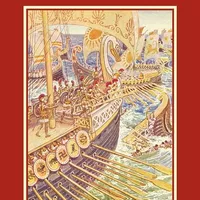23. Some More About Greece
"Two voices are there: one is of the sea, One of the mountains; each a mighty voice. In each from age to age thou didst rejoice; They were thy chosen music, Liberty." —WORDSWORTH.
While Carthage is growing day by day, and year by year, to take her place among the peoples, round the Mediterranean Sea, let us return to Greece, now taking a far larger part in the world's history, than Carthage would ever take. A little inland, on the western coast of Southern Greece, was a wide and beautiful plain. It was watered by a flowing stream and shaded by well-wooded mountains. The spot was called Olympia, and it was dedicated to the worship of the great god Zeus. To this place every fourth year flocked the men of Greece, in olden times, to take part in the great festival, held in the god's honour. Games were the chief feature of the festival.
There was an old story saying that Hercules, when a little boy, had here won a foot-race with his brothers, so some of the Greeks in the south, founded this feast, with foot-races, for all the people to take part in. There were chariot-races and horse-races as well as foot-races; boxing-matches, wrestling, throwing weights, singing and reciting of poetry, so that all might have a chance.
The only prize given to the winners was a garland of wild olive, cut from a sacred tree in the grove. The victors were thus crowned before the people, each holding a palm branch in his hand, while the heralds proclaimed his name and that of his father and country.
From north and south, and east and west, the men of Greece flocked to Olympia. It was a bond of union, for all the scattered tribes of Greece. It helped the colonies to keep in touch with the mother country. It made a centre where men of all parts could meet and discuss matters of importance, and it gave a feeling of brotherhood to those, who were separated by the natural barriers of their divided country.
Now, amongst the chief people who attended these games, every four years at Olympia, were the Spartans. They lived in the south of Greece, and they were supposed to be the descendants of Hercules, and to have settled there, after their return from the siege of Troy. These Spartans were a very strict people, every citizen was a soldier. If a child were born weak or unhealthy, legend said, it was laid out on the wild slopes of the mountain-side to die. Only the strong and healthy were allowed to live.
So the Spartans became a very strong people. When seven years old, a boy was taken from his home, he was taught to endure hardships, and trained to love his country. At twenty he became a soldier and lived under stern discipline. The one aim of his life, was to become a good soldier; he existed for the State alone. His food was of the plainest; he had to wear the same garment summer and winter; no complaints were tolerated. Indeed there are stories telling how the Spartan boys, would die under the lash of the whip, rather than utter a murmur of complaint.
Women were proud of their sons, and urged them to acts of heroism.
"Return either with your shield or upon it," they would cry to the young soldiers, going forth to battle. So the Spartans became a well-trained body of soldiers at a time, when military training was little thought about in Greece. They grew very powerful, and subdued the lesser States around them.
Another important spot in Greece at this time was Athens, and the men of Athens travelled far, to be present at the games of Olympia every four years. They had a lovely city built on a rocky height jutting out into the sea.
There was an old story that the gods Neptune and Athene had a strife as to which should be the patron of the city, and that it was to be given to whichever should produce the most precious gift for it. Neptune struck the earth, and there appeared a war-horse; but Athene's touch brought forth an olive-tree, and this was judged the most useful gift. So the city bore her name, and the olive-tree grew in the court of the old Acropolis, a sacred citadel on a rock above the city.
The King of Athens was called Solon; he was supposed to have been one of the seven wisest men of Greece at this time. He drew up a very clever code of laws for the men of Athens, laws which are spoken of, to the present day.
Corinth was another important centre, from which the Greeks flocked to Olympia. This city stood on the rocky isthmus that connects North and South Greece together; an isthmus called by one of the old poets the "bridge of the untiring sea." And these three States, Sparta, Athens, and Corinth, played a large part in the history of Greece.

